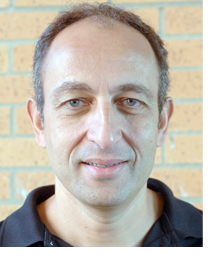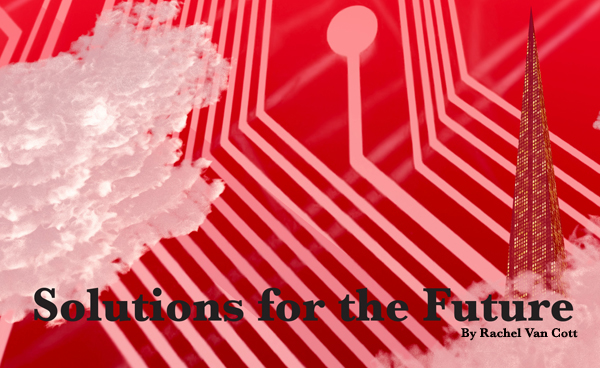When the sun sets on MIT and the Stata Center casts its angular shadow over east campus, most professors head home and leave MIT to the students. But LIDS professor Munther Dahleh doesn't shy away from campus life. He and his wife are housemasters at MacGregor dormitory, where they've lived with their children for more than a decade. At home, just a few blocks from the lab, Munther has to juggle dorm and family responsibilities, and sometimes his work gets pushed into the wee hours of the night. But the forward-thinking professor uses this opportunity to stay in touch with the undergraduate students, and he's grateful for the experience. In the absence of other forces, a university population tends to form social groups according to convenience, said Munther. Graduate students band together with other people from their labs, and professors form the strongest bonds with the masters and PhD and students that they supervise and interact with very frequently. Unless a professor has a house affiliation or some other connection to the undergraduates, he or she might never see the students outside of class. Making the effort to be a part of both communities pays off, Munther said, "It has given me a complete experience of being at MIT. It impacted the way I teach. It impacted the way I approach students with problems...I mean you assign the homework in the day and you see them working on it in the evening and that gives you a whole perspective on what you should expect. MIT is not an easy place."
Munther is sympathetic to the plight of overworked undergraduates, but that compassion doesn't seem to stem from any experience he had as a student. He describes his early studies in terms of chasing his love of mathematics, and his transformation from student to researcher and professor only picked up speed when he entered graduate school. "I always wanted to get a PhD," said Munther, whose Palestinian upbringing stressed the value of education, "I loved teaching. I loved being with other students. I loved the process of doing research. Learning ideas that I didn't know, reading about them. Every day was enjoyable. I didn't feel the stress... it kind of fell in the right place for me." Soon after he graduated with a PhD in Electrical Engineering from Rice University, in Texas, Munther received an offer to join MIT as an Assistant Professor, as part of LIDS. "I liked the people and the place," said Munther with a smile, "and it's hard to turn down MIT."
Now, Munther gets to do what he likes best—teaching and conducting research. Like most of the researchers at LIDS, Munther isn't concerned with one specific sub-field or application. Instead, he works on an unusual subset of problems—the kind of problems that might show up a decade or so from now. "Industry has a lot of immediate problems that need to be solved," admitted Munther, "But the problems that are five or ten years ahead are more open-ended than that. These create new research directions whose impact is realized many years in the future."
The challenge of creating a smart electrical grid is one that fits neatly into Munther's interests. Right now, most of us get our power from conventional energy sources, like gas, coal and oil. They provide a very steady stream of power. But those resources will eventually be replaced or augmented by clean renewable energy sources, like wind and solar power that are distributed in nature. Unfortunately, wind and solar power systems don't produce the same consistent power supply--the electricity production rises and falls as the wind or sunlight does. If we wanted to use renewable energy on a large scale, we'd need some kind of "smart" grid—a system that's capable of reacting to supply and demand, routing power as needed, and managing energy prices to keep the lights on and life as we know it humming along. For now, we don't have enough clean, green, power sources, nor the physical infrastructure for a smart grid. It's an ideal time for Munther to take a look at the issue and define the best way forward. So he's getting started on collaborations with students and economists from MIT thinking about the complicated problem and the economics of trying to restructure the electricity market into a sustainable shape for the future. The emergence of new smart sensors and actuators can enable a truly dynamic electricity market relying on real-time management of both supply and demand.
Another of Munther's projects is bound to become more prominent in the coming years. He and some colleagues, along with a group of graduate students, are looking into how online social networks influence decision-making. Decisions travel through social networks, Munther said. For instance, when one or all of your friends buy a certain product, the odds that you'll buy the same item changes. But how exactly does that social influence kick in over the internet? Do good decisions travel more effectively through the system than bad, or can a few bad choices in just the right (or wrong) time and place cause everyone to make a bad decision? A choice about whether or not to purchase an item is one of the simplest cases of social decision-making, Munther said. In order to investigate that straightforward case, he and his colleagues create a mathematical model that describes an online social group—the individual nodes in the network act in a way that is programmed to be similar to actual users. Once the researchers have created the test network, they can start the simulation and offer an item for purchase. As each "member" of the group decides whether or not to buy the object, the next member node uses her private information and the decisions made by other members of the group to make her choice. One can both analyze and simulate such a model and show what types of networks and private information are necessary for learning. Decision-making over social networks is interesting on its own, but the system is also part of a larger type of problem often found in networked robotics and control systems, known as distributed decision-making—a situation in which each member of a group makes a small choice which is part of a larger decision. "Social networks are a small, but exciting part of distributed decision-making over networks" said Munther, and he's interested in developing his understanding of the general problem.
"I think this is my life -- being in research and working with my students" said Munther. But even a job that feels like a calling comes with challenges. "Research itself is challenging, but that's why we do it. The problems that are hard are not an issue. But balancing everything, balancing between research and teaching, committees, mentoring junior colleagues, and supervising students, and then external things like consulting and so forth...A lot of the days are chopped into blocks and you have to step back and allow yourself to consolidate those pieces. Otherwise you'll feel overwhelmed. I've learned over the years how to limit my responsibilities, not to take on more than I can handle. Not to over promise things that I cannot do." says Munther, "and yet I find myself all the time drawn to everything."




